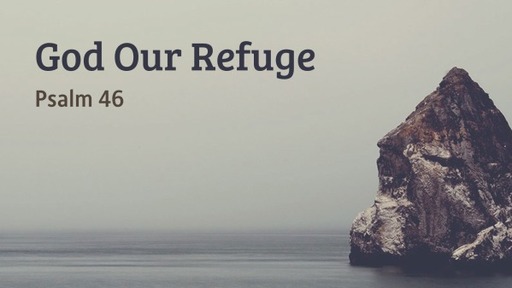God Our Refuge

"We sing this psalm to the praise of God, because God is with us, and powerfully and miraculously preserves and defends his church and his word, against all fanatical spirits, against the gates of hell, against the implacable hatred of the devil, and against all the assaults of the world, the flesh and sin."
Martin Luther
Martin Luther is one of the key figures in church history, a man mightily used by God to bring reformation to the church. The year 1527 was the most difficult of his life. After ten demanding years of leading the Reformation, a dizzy spell overcame him in the middle of a sermon on April 22 of that year, forcing him to stop preaching. Luther feared for his life. On July 6, while eating dinner with friends, he felt an acute buzzing in his ear and lay down, again convinced he was at the end of his life. He partially regained his strength, but a debilitating discouragement set in as a result. In addition, heart problems and severe intestinal complications escalated the pangs of death. p 243
Of this ordeal, Luther wrote, "I spent more than a week in death and hell. My entire body was in pain, and I still tremble. Completely abandoned by Christ, I labored under the vacillations and storms of desperation and blasphemy against God."
What was worse, the dreaded black plague had entered Germany and spread into Wittenberg. Many people fled, fearing for their lives. Yet Luther and his wife Katy remained, believing it was their duty to care for the sick and dying. Although Katy was pregnant with their second child, Luther's house was transformed into a hospital where he watched many friends die. Then without warning Luther's one-year-old son Hans became desperately ill. With death surrounding him on every side, Luther was driven to seek refuge in God as never before. Psalm 46 became the strength of his soul.
As a result, Luther expanded its truths into the hymn for which he is most famous, "A Mighty Fortress Is Our God." Its majestic and thunderous proclamation of God who is our all-sufficient refuge in our weakest moments has become the enduring symbol of the Reformation.
A mighty fortress is our God,
A bulwark never failing;
Our helper He amid the flood
Of mortal ills prevailing.
For still our ancient foe
Doth seek to work us woe—
His craft and pow'r are great,
And armed with cruel hate,
On earth is not his equal.
That word above all earthly pow'rs,
No thanks to him abideth;
The Spirit and the gifts are ours
Thru Him who with us sideth.
Let goods and kindred go,
This mortal life also—
The body they may kill;
God's truth abideth still
His kingdom is forever.
Like Martin Luther, the author of Psalm 46 found solace and refuge in God during difficult times. The background for this song of praise is unknown, but it was probably written after a military victory over a foreign power that attempted a siege against Jerusalem. It may have been written after the destruction of the armies of Ammon, Moab, and Mount Seir (2 Chr. 20:1-30). Or perhaps it was recorded after the destruction of King Sennacherib and the Assyrian army during the reign of Hezekiah (2 Kgs. 18-19). p 244
According to the superscription, it was written by one of the "sons of Korah" (for background on the sons of Korah, see Introduction, Psalm 42) and was "for the director of music." Alamoth may refer to the pitch of the music, denoting that it was to be high for the treble and soprano voices. It may have been implored to refer to certain shrill-sounding instruments (cp. 1 Chr. 15:20).
God is our refuge against the events around us - vs. 1-3
46:1. When we are attacked and assailed by the discouraging circumstances of life, God is our refuge in whom his people will find protection, strength, and stability. God is pictured as a refuge, meaning a strong shelter from danger, an unconquerable fortress, or a walled city where protection is found. Furthermore, when trouble found the psalmist, God was his strength, upholding and enabling him to stand through the fiery trials. To have trouble means to be in a tight place, to be restricted, tied up, or to be in a narrow, cramped place. The psalmist was between a rock and a hard place with no way out. Yet God was with him, an ever-present help in trouble, immediately present and instantly available to his people.
46:2-3. Having understood the all-sustaining power of God, the psalmist wrote, We will not fear. This is a bold statement of confidence in God inspired by the greatness of the Almighty. Regardless of what the psalmist and the people of God face, they have no reason to fear. God is in control. The psalmist continued, Though the earth give way and the mountains fall into the heart of the sea. This is a picture of confusion, represented as a momentous earthquake that caused an upheaval of the tall, lofty mountains. The mountains, representing stability and continuity, seem to collapse into the sea; and the waters roar and foam and the mountains quake with their surging.
This imagery conveys earthshaking circumstances. As the mountains crash into the sea, the sea responds by flooding outside of its assigned barriers. In spite of all this turmoil that pictures devastating circumstances seemingly out of control, we will not fear. God is in control.
